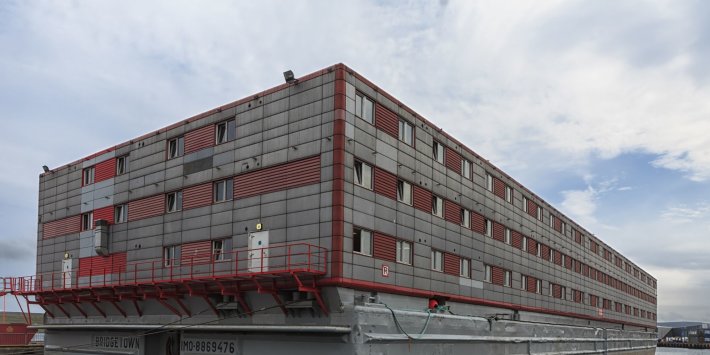Asylum Seekers At Risk Of Missing Out On Healthcare Due To Lack Of Internet Access
The Covid-19 pandemic accelerated the digitalisation of NHS services (Alamy)
4 min read
Asylum seekers are at risk of missing out on essential healthcare due to limited access to digital tools and the internet, according to a new charity report.
A report published by the humanitarian network British Red Cross shows that many migrants experience barriers to UK healthcare due to digital exclusion, which raises new questions around the human rights implications of housing people in temporary and remote sites such as barges.
Activists from the health workers’ community Medact and platform Migrants Organise have raised concerns that the government’s plans to accommodate asylum-seekers in barges, such as the Bibby Stockholm in Dorset, will worsen migrants’ access to healthcare.
As the government plans to use barges and ex-military barracks as a “deterrent” for people crossing the Channel illegally, the British Red Cross are calling for the government to provide free Wi-Fi in accommodation and credit for mobile data and devices, as well as digital literacy training for asylum seekers.
Although the Home Office has a legal duty to support asylum seekers and provide access to local health services, there is no contractual obligation for accommodation providers to provide internet access. On barges such as the Bibby Stockholm, it is unclear what digital access the adult migrants detained there would have under current government plans.
 The Bibby Stockholm in Dorset has been proposed as accommodation for 500 adult male migrants (Alamy)
The Bibby Stockholm in Dorset has been proposed as accommodation for 500 adult male migrants (Alamy)
Olivia Field, British Red Cross Head of Health and Resilience Policy, said: “Access to the internet, smartphones or computers is not a luxury.
“These tools are a necessary part of communication in our modern world and increasingly vital for accessing basic healthcare services. Without them, people’s health is put at risk and it's harder to integrate into communities, with an increased risk of isolation.
“We must listen to the concerns of people seeking asylum. Providing Wi-Fi in asylum accommodation, improving digital literacy training and making sure people have non-digital ways of accessing healthcare services are just some of the small steps the government and NHS can take to make sure everyone can get the care they need when they need it.”
The report interviewed people seeking asylum and identified that the affordability of devices and mobile data, a lack of Wi-Fi in asylum accommodation, and a lack of confidence in using technology and navigating websites in English were preventing people from seeking and receiving medical treatment.
Pointing out that the Covid-19 pandemic sped up the process of healthcare services becoming digital, the British Red Cross warned this kind of access is more difficult for people seeking asylum – especially for those who previously had limited digital access or cannot speak English.
One asylum seeker described how they felt “so isolated” due to a lack of internet access, while another described how a lack of privacy in communal accommodation made it difficult to access online healthcare or make phone appointments.
A person from Zimbabwe said they had to “ask random people in the street for help to buy credit or to pay for bus fares in order to reach the doctor for treatment”.
In a joint statement, Aliya Yule from Migrants Organise and James Skinner from Medact said the living conditions in barges would cut people off from public services.
"The government’s attempt to house people on barges as ‘temporary holding bases’ is yet another example of how their hostile immigration system denies people their basic rights, including the right to healthcare, by making it impossible for people to access services that they need,” they said.
"The conditions in which the Home Office chooses to house people drive poor health, both through limited access to primary care and through overcrowding, substandard food and restrictions to peoples’ movement.
“Our members at Migrants Organise who have been housed in dire hotel accommodation for several years know all too well the long-term impact that these degrading conditions have on their physical and mental health.
"The government makes the baseless claim that these poor conditions will discourage people from seeking protection in Britain, but in reality, people seeking safety are forced to suffer inhumane conditions with no access to public services, isolated from communities of support."
The British Red Cross report also spoke to people who said they could not get through to a GP so went straight to A&E for basic health problems, putting further pressure on already strained NHS emergency departments.
A Home Office spokesperson said: “We are dealing with an unprecedented increase in asylum cases but continue to ensure asylum seekers who would otherwise be destitute are provided with support whilst we consider their claim.
“Asylum seekers have access to health and social care services from point of arrival in the UK and we work closely with the NHS, local authorities and contractors to ensure that asylum seekers can access the support they need. We also work with local and national organisations to facilitate the donation of digital devices.”
